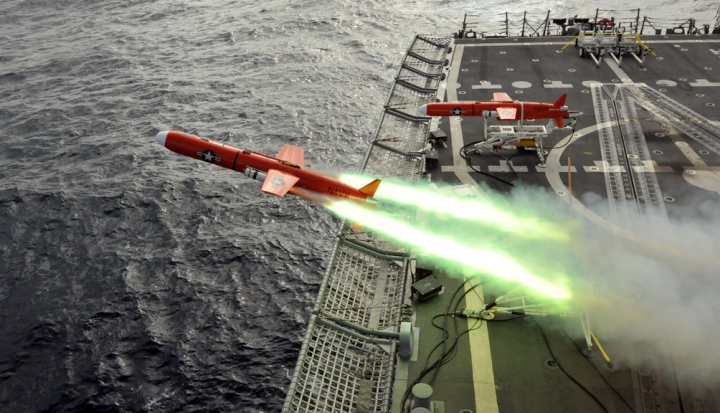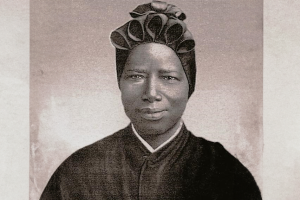Our country’s drone policy has been operating mostly behind closed doors. According to law professor David Cole, that’s a troubling reality for a program that is responsible for taking human lives. In order to move forward, he says, we need to have transparent knowledge of the nation’s drone policy so that the American people have the opportunity to keep the government accountable for its decisions.
Besides teaching constitutional law, national security, and criminal justice at Georgetown University in Washington, Cole has worked extensively on issues pertaining to civil liberties and human rights. In this web-exclusive addition to an interview conducted by U.S. Catholic that appeared in our September 2013 issue, Cole compares and contrasts the current administration’s drone policy—and the public’s reaction to it—to the previous administration’s torture program.
Why would our current president—a constitutional law scholar—feel compelled to use drones? Is the option just too appealing?
I think the lines are not easy to draw. The threat of terrorism is serious. President Obama’s responsibility is to protect Americans. It’s becoming harder and harder to capture those who threaten us. With drones, we have a tool that doesn’t put Americans at risk and that reduces the likelihood that we are going to be attacked under his watch. But the rules as to its proper use are unclear.
I think it’s important to distinguish the drone program from a torture program. We rightly objected to President Bush authorizing that people be tortured, but now President Obama is killing people and some have noted that we’re not getting as riled up about that. I think we should be up concerned about both policies but for different reasons.
Why is that?
Torture is never permissible. It is absolutely prohibited, including specifically in war times. It’s just not justifiable. What the Bush administration was doing was adopting a tactic which the entire world said is ethically, legally, and morally wrong and forbidden, absolutely, period.
What Obama is doing is taking a tactic–killing in war time–which the world has never said is absolutely forbidden. To the contrary, the world has acknowledged that it’s a part of war. Obama is applying that tactic to a conflict that has hazy borders and to an enemy that isn’t a state, that morphs over time, that moves around, and yet that continues to threaten us.
The question is: How should this traditional tactic of wartime be adapted to this new kind of war? There are a lot of hard questions there and I don’t know for sure that the administration has gotten the answers right or wrong. I think the Obama administration is trying to act within the frame of the law, but the frame of the law might not be adequately developed to address this new problem of non‑state actors that can do a serious amount of damage to a state, or this new kind of tool, drones.
What role can public opinion play in shaping the administration’s choices?
Take torture, for example. President Bush used torture in secret. When it became public, there was a very sustained critique which led to, among other things, the McCain Amendment. The amendment, which prohibited the use not only of torture, but also of any cruel, inhumane, and degrading treatment to interrogate foreigners abroad, was probably the biggest loss that the Bush administration sustained in Congress in its entire eight years.
From what we know, in response to that and various other pressures, the Bush administration stopped waterboarding people. They kept the program in place, but they weren’t actually employing it. Then President Obama came into office and stopped it, banned it, and released the many previously secret Bush administration memos authorizing it, so I think it will be very hard for another president to ramp up the torture program again in the future.
With the drone program, we haven’t had the kind of accountability that you need to really build a precedent that would keep a certain power off the table, or even impose meaningful constraints. The torture program, then, is one example of how public opposition can compel the executive branch to curtail its conduct in accordance with law. But to do so, there must be transparency.
Why do you think that there hasn’t been as much of a public outcry among the American people about the drone program?
Polls here suggest something like 65 percent of people approve of drones to kill terrorists abroad. If you ask them instead, “Would you be in favor of someone being killed by a drone in the United States?” I imagine the result would be very different. It’s no accident that Rand Paul focused his 13‑hour filibuster on the potential use of drones against Americans in the United States and that most of the concern that has been articulated by politicians has been about the use of drones to kill Americans, not foreigners.
I think in part the reason that Americans don’t care is because, by and large, the victims are not Americans. If the claim is, we’ll sacrifice their rights, or in this instance their lives, for your safety, a lot of Americans will accept that. As with many of these subjects, I think much of the battle is education and advocacy to bring matters to Americans’ attention that they don’t otherwise confront in their daily lives.
If the administration is exercising this remarkable authority by using drone strikes, shouldn’t it have to lay out to us what the grounds are that it asserts authorized it to do so? Because if we think, as citizens, that’s wrong, then we should be able to respond. As long as it’s secret, we don’t have the tools to respond to it.
So what are some steps you think we, as a country, should take going forward regarding drones?
I think the first step on a path forward is transparency: the administration telling us what they’re doing, what their justifications are for what they’re doing, and what the results are of what they’re doing. President Obama’s speech in May 2013 offered some transparency, but there is still far too much that we do not know about how the process works and what the rules are. Second, after we’ve learned what the government is actually doing in our name, would be a political assessment of whether we as the American people, through our representatives, believe that what they have done is acceptable. Third might be a legal challenge in court to whether or not what they’ve have done is legally consistent with the Constitution and the laws of war. Fourth is, as George W. Bush once put it, “the global test.” Are the rules that are being used and the practices that are being engaged in acceptable to the world at large under the Geneva Conventions and the law of war? But we can’t even start on this road to accountability unless we demand much more transparency than we have had thus far.
This is a web-only sidebar that accompanies “Drone wars: Shedding light on our country’s secret program“, which appeared in the September 2013 issue of U.S. Catholic (Vol. 78, No. 9, pages 26-30).
Image: Flickr photo cc by Official US Navy Imagery














Add comment